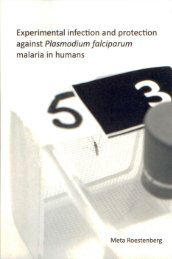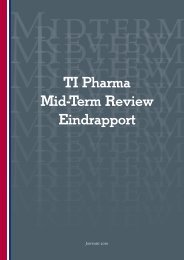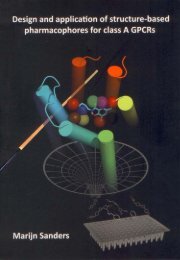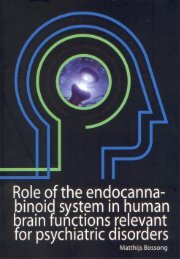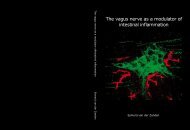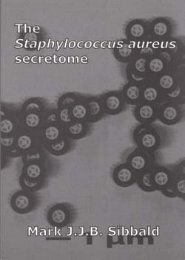Chromosome segregation errors: a double-edged sword - TI Pharma
Chromosome segregation errors: a double-edged sword - TI Pharma
Chromosome segregation errors: a double-edged sword - TI Pharma
Create successful ePaper yourself
Turn your PDF publications into a flip-book with our unique Google optimized e-Paper software.
5<br />
Abstract<br />
The mitotic checkpoint has evolved to prevent chromosome mis<strong>segregation</strong>s by delaying mitosis when<br />
unattached chromosomes are present. Inducing severe chromosome <strong>segregation</strong> <strong>errors</strong> by ablating the<br />
mitotic checkpoint causes cell death. Here we have analyzed the consequences of gradual increases in<br />
chromosome <strong>segregation</strong> <strong>errors</strong> on the viability of tumor cells and normal human fibroblasts. Partial<br />
reduction of essential mitotic checkpoint components in four tumor cell lines caused mild chromosome<br />
mis<strong>segregation</strong>s, but no lethality. These cells were, however, remarkably more sensitive to low doses<br />
of taxol, which enhanced the amount and severity of chromosome <strong>segregation</strong> <strong>errors</strong>. Sensitization<br />
to taxol was achieved by reducing levels of Mps1 or BubR1, proteins having dual roles in checkpoint<br />
activation and chromosome alignment, but not by reducing Mad2, functioning solely in the mitotic<br />
checkpoint. Moreover, we find that untransformed human fibroblasts with reduced Mps1 levels could<br />
not be sensitized to sub-lethal doses of taxol. Thus, targeting the mitotic checkpoint and chromosome<br />
alignment simultaneously may selectively kill tumor cells by enhancing chromosome mis<strong>segregation</strong>s.<br />
88




